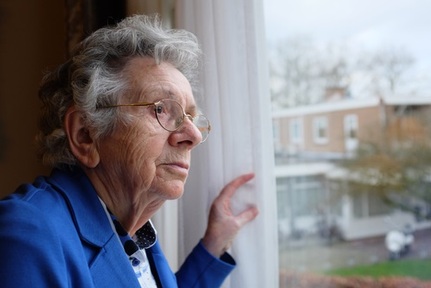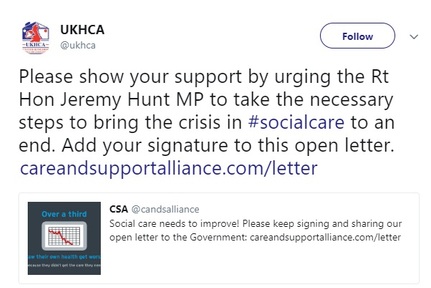Elderly feel suicidal over battle to get care at home
Older people are living in misery without home care and some like ’Brian’ have considered taking their own life because council cuts have taken away 3 million hours of home care since 2015, leaving them trapped without help in a ‘care desert’.

Some 400,000 people do not get free care at home because of council cuts and some do not get it at all because of local ‘care deserts’.
The charity Age UK has warned in its report ‘Behind the Headlines – the battle to get care at home’ published 1 June, just how bleak the real life stories of people reliant on home care are, as a result of cuts to councils' social care budgets.
’He feels suicidal and it’s no surprise’
Caroline Abrahams, charity director at Age UK, said: “Included in our new report are real life stories from older people like ‘Brian’."
Brian had a care assessment by social services three months ago but hasn’t heard anything since, and is sleeping on the sofa in his living room because he can no longer manage the stairs.
“Brian says he feels suicidal and it’s no surprise.
“Three million hours of home care have been lost in the last three years because of Central Government cuts and the lives of many older people have been sharply diminished as a result.
“Our new report shows the appalling human consequences as councils struggle to do the impossible: meet growing needs for home care with grossly inadequate resources.”
John cannot wash himself - council said help could be a year away
‘John’ has been registered disabled for over 10 years. His health problems have got worse over the last year. He is 79 and cannot get washed anymore without help. He is in pain and finding life difficult. He also doesn’t have anyone to help locally.
John phoned social services and completed a form over the phone but has heard nothing back. At the time he rang, last autumn, his council said it could take until next year for anyone from social services to come round.
Some councils have told people there is no home care available in their area for them to purchase on their behalf – resulting in what the charity calls a ‘care desert’.
Since 2009/10 local councils have seen a 26 per cent drop in their budget. This led to a six per cent cut in direct council spending on adult social care. At the same time, the number of people aged 65+ has grown by seven per cent and the number aged 85+ by six per cent.

The average spend per adult on social care fell 13 per cent (from £439 to £379) between 2009/10 and 2016/17. During this period, 400,000 fewer older people received social care as eligibility criteria was tightened by councils struggling with rising demand for care.
Last year’s Association of Adult Directors of Social Services Annual Budget Survey report found 39 per cent of councils had at least one home care provider cease trading in their area and 37 per cent of councils had at least one home care contract ‘handed back’ – meaning the home care provider had pulled out of providing services to council clients.
The charity director added: “At Age UK we have been worried for some time about the possible emergence of ‘care deserts’ – places where it is impossible to find any care at all – and now it seems our worst fears have been realised.
Bedbound and living in a care desert
The charity says older people and families are paying the price as 'too often', they find themselves trapped in a nightmare of bureaucracy and kept at arm’s length by local authorities struggling to meet growing demands for care.
‘James’ is severely disabled and bed bound, and he has recently been in hospital following an infection. He should have four care visits a day but has called in distress as no one has turned up yet today. He has repeatedly tried to phone social services this morning but the line is constantly engaged. He doesn’t know who else to ring.
Personal experiences highlighted in the report are a snapshot of the calls received by Age UK (between September 2017 and March 2018) to its Information and Advice line. (Names, gender have been changed to preserve callers’ confidentiality.)
Callers from across the country described:
• Long waits to get a care assessment
• Disjointed or unresponsive care services
• Lack of capacity in the system
• Poor quality services and support
• Services being cut back even though people’s needs have stayed the same or increased.
• Help for families providing care cut back

People in need of care have to pass a strict eligibility criteria and a stringent means test. First, they must show they fulfil the assessment criteria that councils use to decide whether someone has ‘eligible needs’. Secondly, they must demonstrate that their savings and income are low enough to qualify for council funding under the means test.
Nearly all home care (97.5 per cent) is provided by independent organisations, with councils commissioning most of it. The remainder is organised and paid for privately. Age UK's report concludes: “Unfortunately, the home care system is in crisis and falling short on just about every measure.”
Home care providers say: 'Fix our broken system'
The UKHCA, representing home care providers, wants the public to sign its open letter to Health and Social Care Secretary Jeremy Hunt urging him to address the 'crisis in social care' and 'fix our broken system'.
In a tweet, the UKHCA stated: "Please show your support by urging the Rt Hon Jeremy Hunt MP to take the necessary steps to bring the crisis in #socialcare to an end."
You can add your signature to the UKHCA's open letter, which had 11,750 signatures (on 1 June) by visiting: www.careandsupportalliance.com/letter
Cases raised by Age UK included references to suicide. If you are feeling emotionally distressed, you can get support from the helplines below:
• Samaritans: Tel: 116 123
• MIND: Tel: 0300 123 3393
• Anxiety UK: Tel: 08444 775 774
• Silverline (for older people) Tel: 0800 470 80 90
Latest News Analysis
 04-Sep-19
Extra £1.5 billion announced for social care in Chancellor's Spending Review
04-Sep-19
Extra £1.5 billion announced for social care in Chancellor's Spending Review
 17-Jul-19
Flexible Working Bill for all jobs gets MPs approval - delighting parents, disabled and carers
17-Jul-19
Flexible Working Bill for all jobs gets MPs approval - delighting parents, disabled and carers
 18-Jun-19
Overnight care workers forced to sleep in offices and told 'bring your own bedding'
18-Jun-19
Overnight care workers forced to sleep in offices and told 'bring your own bedding'
 11-Jun-19
PM candidates on social care: Rory Stewart calls fixing care an 'unfinished revolution'
11-Jun-19
PM candidates on social care: Rory Stewart calls fixing care an 'unfinished revolution'
 05-Mar-19
Amber Rudd announces scrapping of controversial PIP payment review for pensioners
05-Mar-19
Amber Rudd announces scrapping of controversial PIP payment review for pensioners